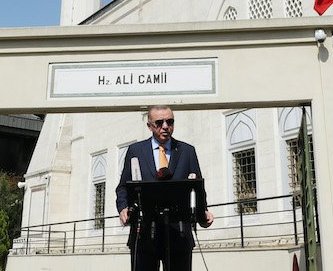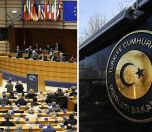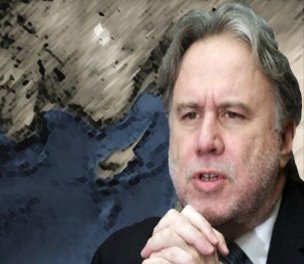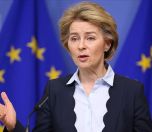Minister Çavuşoğlu (Photo: AA)
Click to read the article in Turkish (1) (2)
The Ministry of Foreign Affairs has summoned Greece's envoy over a headline in a Greece-based newspaper including vulgar expressions about President Recep Tayyip Erdoğan.
Insulting and cursing should not be seen in terms of freedom of the press, Mevlüt Çavuşoğlu said today (September 18) at a news conference.
"We showed the strongest reaction," he said.
He also stressed that there is no point in embarking on new initiatives in Cyprus which are "doomed to fail."
"We have said over and over again that we will no longer negotiate for a federation on the Cyprus issue," he said.
New Navtex alert for Barbaros Hayreddin vessel
Turkey today issued a new Navtex (navigational telex) alert for Baybaros Hayreddin Paşa seismic survey vessel, stating that it would continue exploration activities until October 18.
The vessel will carry out seismic activities off Cyprus coast, an area it considers as the continental shelf of Northern Cyprus.
"Tanux" and "Apollo Moon" ships will escort the vessel, according to the Navtex alert.
Defense Minister: France adds fuel to fire
France's President Emmanuel Macron is adding fuel to the fire in the Eastern Mediterranean and making it harder to solve problems, said the Turkish defense minister on Friday.
In an exclusive interview with Britain's Channel 4 News, Minister of National Defense Hulusi Akar said President Emmanuel Macron of France was "trying to take on the role of Napoleon but not strong enough for this."
Akar said Macron is trying to have some roles in the Eastern Mediterranean to obscure his problems in France.
"He is trying to play a role in the Eastern Mediterranean by coming from thousands of kilometres away," which is not right, Akar said.
He stressed that Turkey defends its rights and interests, reminding that it has approximately 2,000 kilometers (around 1,242 miles) of coastline in the Eastern Mediterranean.
NATO
On NATO's meditation efforts, Akar said while Greece is reluctant and slowing down the solution of the Eastern Mediterranean issue with some preconditions, Turkey supports holding these meetings.
Drawing attention to Greece's activities in the Aegean Sea, Akar said Greece has armed some islands, especially Meis, or Kastellorizo, in the Aegean and region in violation of international law.
"This is a violation of international law and agreements between countries. This is a threat to Turkey. This has a negative impact on good neighborly relations," he said.
"Our Greek neighbors selfishly speak about their rights. They have a tendency to ignore our rights in every condition. This is not acceptable," Akar said.
Turkey only expects respect to its rights from all parties, he noted.
EU's stance
In regard to the EU attitude to the issue, he said the EU does not contribute to the solution and has become a part of the deadlock.
He said the EU does not have any authority to set or change rules or draw borders in the Eastern Mediterranean.
On the sanction calls of EU members to Turkey, he said it is a "threatening language" that they frequently speak of sanctions in various ways.
"This attitude of the EU only raises the tension," Akar added.
The EU should understand that everyone should abide by all rules of international law, Akar stressed, adding that the bloc, especially Macron, is extremely partisan and biased on the issue.
Exploration activities
On the hydrocarbon exploration activities in the Eastern Mediterranean, Akar said Turkey is doing technical and scientific works in the region as it has done before within its continental shelf.
"We are doing this in the framework of our own rights. There is no provocation of any kind here," he highlighted.
Akar also said Turkey's work in the region consists of planned, scheduled, open, and transparent use of existing rights.
Tensions have recently escalated over the issue of energy exploration in the Eastern Mediterranean.
Timeline of the Eastern Mediterranean crisisThe tension between Turkey and Greece over their right to explore energy resources in the Eastern Mediterranean has seriously escalated over the last months. The latest developments leading to this escalation are briefly as follows: On July 21, Turkey issued its first Navtex alert for Oruç Reis seismic vessel's exploration activities in the Eastern Mediterranean. On July 28, Turkey announced after Germany's diplomatic efforts that it suspended hydrocarbon exploration activities and stated that it was ready to talk with Greece. On August 6, Greece and Egypt signed a maritime border agreement. On August 10, Turkey announced that its drillship Oruç Reis would resume energy exploration in the Eastern Mediterranean. It said the ship will continue its work along with the ships Cengiz Han and Ataman until August 23. On August 14, the EU foreign miniters discussed the crisis at an extraordinary meeting, calling on Turkey to end hydrocarbon exploration activities in contested waters. On August 16, Turkey issued a Navtex, announcing that its drill ship Yavuz will continue its work exploring for energy resources off the island of Cyprus. On August 23, Turkey issued another Navtex, stating that the Oruç Reis vessel would continue its activities until August 27. On August 24, Greece held joint naval drills with the US in the south of Crete island. One day later, Turkey conducted naval exercises with Italy. On August 25, Germany's Minister of Foreign Affairs Heiko Maas visited Athens and Ankara to encourage the two countires to have direct talks. On the same day, Turkey held replenishment exercises with Italy in the Eastern Mediterranean. On August 26, US President Donald Trump had phone talks with President Recep Tayyip Erdoğan and Prime Minister of Greece Kyriakos Mitsotakis, urging them to reduce tensions and start dialogue. On the same day, Turkey and the US conducted joint maritime exercises. On August 27 and 28, EU foreign ministers met with the Eastern Mediterranean crisis on the top of their agenda. The Union's foreign polict head Josep Borrell said after the meeting that Turkey's ships might be sanctioned if they continued hydrocarbon activities. Turkey's Ministry of National Defense on August 28 announced that it intercepted six F-16 fighters planes of Greece, which it said were closing in on the area where Turkey issued a Navtex. On September 1, the US lifted the arms embargo on Southern Cyprus. On September 2, Turkey issued two Navtex alerts for Russia's gunnery exercises in the Eastern Mediterranean. It was stated that Russia would conduct exercises in two different areas that correspond to Turkey's hydrocarbon exploration activities on the east and west of the Cyprus island. On September 3, NATO Secretary General Jens Stoltenberg said, "Following my discussions with Greek and Turkish leaders, the two Allies have agreed to enter into technical talks at NATO to establish mechanisms for military deconfliction to reduce the risk of incidents and accidents." On September 4, Prime Minister of Greece Kyriakos Mitsotakis said that Greece would only enter into a dialogue with Turkey if it "stops provocations" in the Eastern Mediterranean. Shortly before this statement, Turkey's Foreign Ministry stated, "Turkey is ready to enter into dialogue with Greece without any preconditions." On September 10, military delegations from Turkey and Greece had technical talks at NATO headquarters to prevent military engagement. On Septemebr 15, issuing a new NAVTEX alert for the Chios Island of Greece, Turkey argued that Greece had militarized Chios Island in violation of the 1923 Lausanne Peace Treaty. The military delegations from the two countries held the second technical meeting. On September 17, the European Parliament warned Turkey of sanctions if it continues its hydrocarbon exploration activities. |
Maritime border claims of Turkey and GreeceTurkey signed a maritime border agreeement with Libya's Governmenf of National Accord (GNA) on November 27, 2019. Greece and Egypt signed a simillar agreement on August 7. |
(EKN/VK)









-132.jpg)

